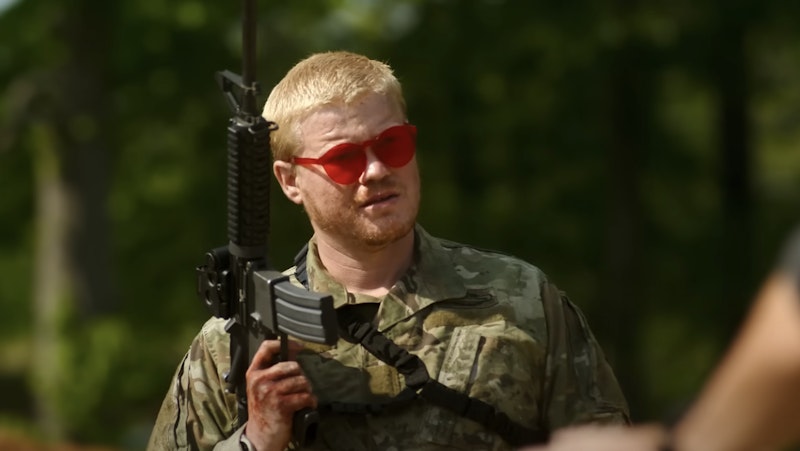Civil War, a dystopian depiction of a divided United States, opens up with the American third-term president (Nick Offerman) addressing the nation, assuring the people that their armed forces are on the verge of an historic victory, which they’re not. The so-called Western Forces—an alliance between California and Texas—have, according to him, “suffered a very great defeat.” “The Florida alliance,” the president continues, “has also failed in its attempt to force the people of the Carolinas to join the insurrection.”
Texas and California are allies in an insurrection attempt, presumably brought together in opposition to the fascist tyrant in the White House. But that tyrant isn't a thinly-disguised Trump. Director Alex Garland has no intent of bludgeoning either the Left or the Right with his film, which is an anti-war cautionary tale. The director said in an interview, “It's a film about division and polarization, and I don't see any need to add to that.”
It's also a film about the horrors and moral ambiguities of wartime journalism, with emphasis on how an adrenaline-driven crew of journalists cares more about getting the shot than who gets shot. The message is that such work erodes the soul, which Kirsten Dunst, in a fine performance, conveys artfully with her face in countless shots.
After the presidential speech, the camera cuts to New York City, which is running out of water and beset by street uprisings. The four characters at the core of the story—Lee (Dunst), Joel (Wagner Moura), Sammy (Stephen McKinley Henderson), and Jessie (Cailee Spaeny)—are introduced as they cover the turmoil while embedded in the rebel army. Veteran war photographer Lee meets Jessie, who looks up to her, as the two shoot the violence. Afterwards, Reuters journalists Lee and writer Joel describe their plan to mentor Sammy to drive to the nation’s capital to interview the president. Sammy says it's too dangerous, but joins them so he can get to the front line in Charlottesville. Joel talks the hardened journos into allowing Jessie, a young woman who barely looks out of high school, to tag along for the ride.
Like many, I watched this film under the misunderstanding that it would be about the civil war we're always hearing is brewing in this country, but the conflict Garland presents is generic. The director shows no interest in the politics underlying the insurrection he portrays. He has other points to make. Like the journalists at the heart of the story, Garland doesn't take a side, making it impossible to judge his film by whether or not he chooses the “right” side to favor. That’ll disappoint plenty of viewers, but if they're patient they shouldn't have to wait much longer for the film they're looking for.
On the way to D.C., Lee, Joel, Sammy, Jessie see dozens of cars bombed on a highway in a scene that's almost identical to a scene in the Obamas-produced Leave The World Behind, another film that provides sparse details on the origins of a national catastrophe. They stay at a refugee camp. They witness a man tortured by gun-toting rednecks for “looting.” Lee calmly gets one of them to pose with the tortured men. In the car, Jessie bemoans the fact that she was too shaken up to take even one photo, asking if maybe she could’ve helped the two captives. Lee admonishes her. “We record,” she says, “so other people ask. That's the job.” Forced by the job to deaden their consciences, the four of them are trapped in a hells both on the outside and internally, relying on booze at night to numb their brains to the trauma and guilt.
The trauma gets amped up when the foursome, plus a couple of fellow journalists who've joined them along the way, discover a paramilitary group dumping dead bodies into a mass grave. They get too close, and a psychotic militia member (Jesse Plemons, once again displaying his talent for projecting nonchalant menace) shoots two of them—both Asians—for not being “real” Americans. The first shot comes from so far out of the blue that it provides a heart-stopping moment of cinematic terror. Sammy comes to the rescue by ramming the murderers with their press vehicle, and the foursome’s able to escape. Somehow, none of the militia members heard the approaching vehicle on a gravel road until it was right on top of them.
The cinematography in Civil War is beautiful, the soundtrack has some good needle drops, and the action shots are riveting, but there isn't enough entertainment or thoughtfulness at the center of the film to make it an enduring one, despite the fact that its British director works hard to deliver hard-hitting commentary on what the polarization of America can lead to.
Garland doesn't want to give viewers any likable characters, as in a regular war movie, because the war he's presenting is so grim that such characters don't exist. I don't have any desire to rewatch it, but I'd be happy to rewatch another civil war film with journalists at the center of the story, for probably the fourth time. Oliver Stone’s Salvador (1986), explodes with energy, with the help of a crackerjack performance by James Woods. The politics underlying the conflict are clear cut. Alongside that film, Civil War looks plodding and over-serious.

